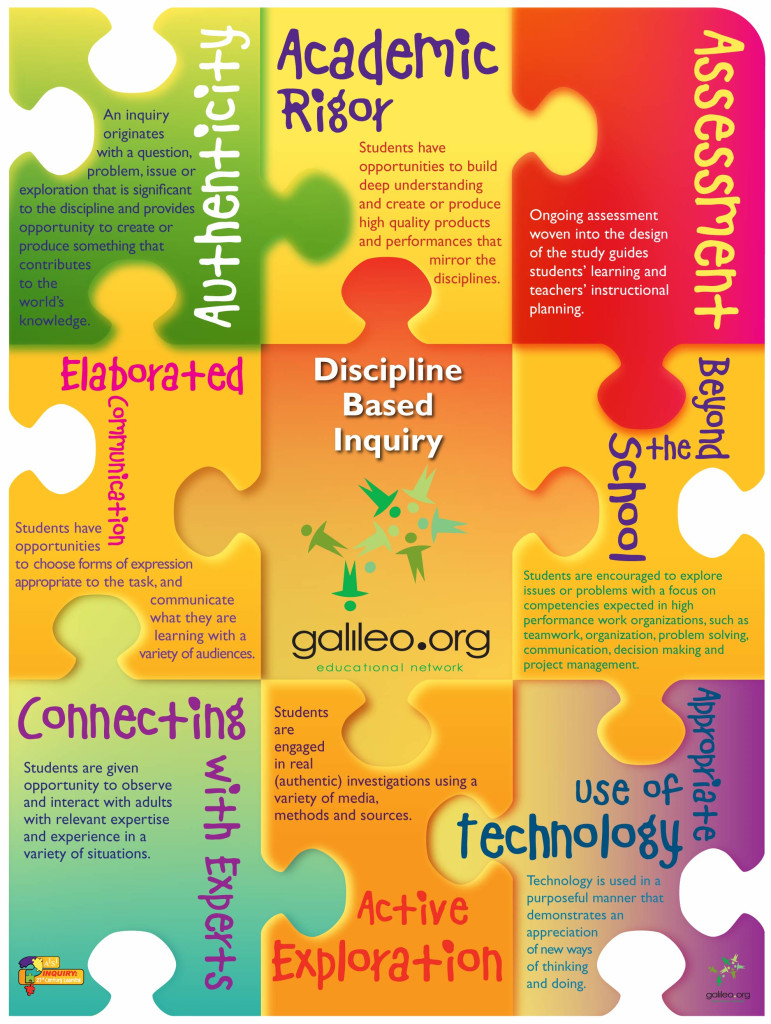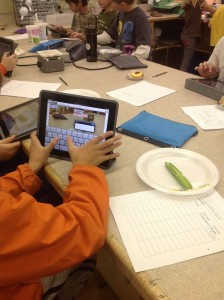“Inquiry is a dynamic process of being open to wonder and puzzlement and coming to know and understand the world.”
Gallileo.org
Gallileo.org has identified three different models of inquiry:
- universal inquiry – focus on process, step-by-step framework
- minimally guided inquiry – student and experience centred
- discipline-based inquiry – deep immersion into ways of thinking of a particular discipline; deep mastery of a few disciplines rather than superficial knowledge of many.

With discipline based inquiry, I like the description of teachers as “the activators of learning” who guide students to ask probing questions to clarify assumptions or logical consequences of a thought (Galileo, 2015a). This sounds a lot like teaching critical thinking, which in the post-truth era we live in, is a vital skill for life where it is becoming increasingly difficult for people to know what is true/real and what is untrue/fake. Some great examples of this are the rise in populist political leaders in many countries whose narrative is easily challenged by fact-checking yet believed to be truth by many voters; or the increase of deep-fake imagery/videos and AI scams, tricking people into believing something that is not real.
There’s a video by Amy Park from the Galileo Education Network (Galileo, 2015a) about her inquiry journey as an educator. She makes what I think is an important point about choosing inquiry tasks with purpose, that are authentic to the discipline, which the above rubric helped her learn to do. She cautions about the use of fun inquiry activities that are exciting for teachers and students but do not result in deep learning. This is my experience of inquiry, that it can be done for the sake of doing it, or done through project-based learning, but doesn’t really build deep knowledge in a discipline or competencies.
I was fortunate to do some classroom hours with a local elementary teacher this year, supporting her teaching French to grades 5/6. She is, by her own admission, a big fan of inquiry-based learning, having been on a course relatively early in her teaching career and seen how it can engage students. She also, by her own admission, hates worksheets. I was curious to see how she managed to teach beginner level French with inquiry methods. Unfortunately, I came away from the experience questioning the validity of inquiry-based learning for entry-level language learning. I saw a few problems with the approach taken, where students were asked to build a PowerPoint presentation of their interests in French based on an example provided:
- Students lacked the basic knowledge or foundations upon which to form their inquiries (i.e. they didn’t any vocabulary or basic grammar understanding, like how to conjugate ‘avoir’ and ‘être’ in the present tense to build simple phrases using ‘I have’, ‘I am’, ‘You have’, ‘You are’. They were given example phrases, but they lacked the knowledge to adapt them to what they wanted to say).
- Students seemed confused about the lack of structure and having to figure things out for themselves using Google Translate. They also didn’t have the language skills to know if what they were getting from Google Translate was accurate, so many made mistakes in their presentation without even knowing it.
- Students focused on the areas they felt comfortable with, such as looking for images to illustrate slides and just copy and pasting words in, which didn’t result in any language learning.
- Students weren’t practicing speaking or pronunciation, they created their slides but when asked to speak to eachother using the French phrases they created they were reluctant to do so (possibly because they had no confidence that the phrases were correct).
- Lessons were only 30 minutes long. It typically took 10 minutes to settle the class, 5-10 minutes to explain what needed to be done and answer questions, leaving the students with about 10-15 minutes to work on their projects before they had to pack up and move to the next class. Inquiry-based learning or project-based activities need more time!
I feel strongly, based on my own language learning as both a child and adult in French, Spanish, Sinhala, and German, that inquiry-based methods are not the best approach to beginner language learning. Students need more teacher-led instruction to acquire the basic building blocks of vocabulary and grammar to get started in a new language. However, inquiry could definitely be used for the cultural appreciation side of language learning, such as investigating where the language is spoken and aspects of the countries (culture, society, sports, etc.) that use the language.
I fully agree with the view that education is not just about learning knowledge, but about learning how to live. According to Dewey, education should enable students to fulfil their potential, enabling them to become active participants in a strong democracy, and promoting the common good (Galileo, 2015a). Inquiry-based learning can help students become more self-sufficient and resourceful which builds not just knowledge but competencies and skills for life.
In addition to learning through play, mentorship, and self-directed learning, inquiry-based learning happens whether we plan for it or not. When anyone is curious or confused and then uses that curiosity or confusion to drive their own learning, they’re ‘doing’ inquiry-based learning.
TeachThought, 2017
Inquiry can encourage students to follow their natural curiosity and keep them engaged in a topic by following their own interests and making their own choices.
The questions above are ones that children can ask to inspire inquiry-based learning ideas.
The ability to ask questions, to explore learning in a direction that interests you, is much more engaging and fulfilling in my experience than being a passive recipient of information that has to be noted, remembered and repeated without discussion or challenge.
Questioning, discussion, collaboration, research, problem-solving, design are all great competences for life!

When I teach alpine skiing, I use inquiry so the client can learn and build knowledge by asking their questions, discussing technique and tactics, problem-solving how to deal with different terrain, and most importantly that the lesson covers their interests and needs and is not formulaic. We prompt clients to ask questions and think about the answer as they ski, guiding them with cues to learn for themselves as they go. We cover the four phases of inquiry-based learning (TeachThought, 2017): there is a lot of interaction, clarification, questioning, and even design, which I would say is the client creating their own “product” in the changes they choose to make to their skiing.

Technology & Inquiry
Technology has to be used effectively to support innovation, to design, create, and build knowledge. It can help students to explore subjects in more depth, problem-solve, organize and share information in different ways, collaborate.. all if used effectively, which requires thought and planning by educators.
According to the team at Galileo Education Network, technology can be used at any stage of an inquiry in the following ways:
- Searching for valid information;
- Posing worthwhile questions;
- Collaborating with others;
- Organizing ideas and people;
- Testing and modelling emerging understandings;
- Communicating understanding through images, sound and movement as well as text; and creating wide and authentic audiences for student work (Galileo, 2015b).
I believe it’s important therefore that teachers are trained on use of edtech that can be implemented in the classroom, and have confidence in applying it to learning activities. Confidence comes from knowledge, experience and practice using different technologies. Technology and inquiry should therefore be part of district and school strategic plans, not just for student learning, but also for staff learning and professional development, so that technology is implemented as more than a substitution for paper and white boards.
References
TeachThought. (2017, May 1). 6 questions students can use to guide their inquiry-based learning. TeachThought. https://www.teachthought.com/pedagogy/questions-students-can-use-guide-inquiry-based-learning/
Galileo. (2015a). What is inquiry? Galileo Educational Network. https://inquiry.galileo.org/ch1/what-is-inquiry/
Galileo. (2015b). The essential role of technology. Galileo Educational Network. https://inquiry.galileo.org/ch2/the-essential-role-of-technology/
